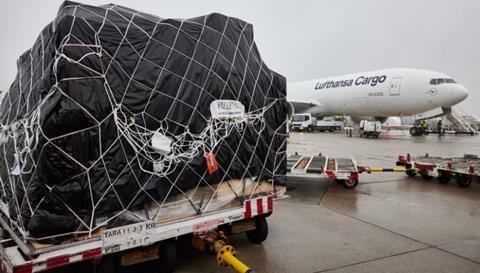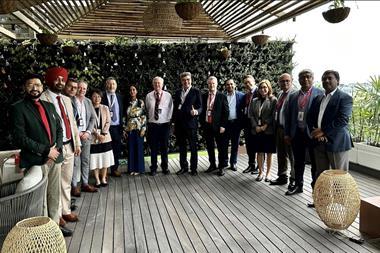
Lufthansa Cargo will from January begin using lightweight nets to secure cargo pallets to save weight on flights and reduce CO2 emissions.
The “Pallet Net Zero” nets made by AmSafe Bridport, which Lufthansa Cargo will be using through its subsidiary Jettainer, weigh between nine and eleven kilograms, which is less than half the weight of a conventional net made of polyester fibres.
Pallet Net Zero is made out of a bio-based fibre – a pioneering material extracted from renewable bio-based raw materials.
The weight reduction of the new nets is largely achieved by the high tensile strength of the special fibre.
The reduced weight of the transport nets saves Lufthansa Cargo around 140 tons of fuel and therefore around 440 tons of CO2 per year, said the airline.
Lufthansa Cargo will be Jettainer’s first customer to use the new, lighter Pallet Net Zero solution. The ULD expert will make around 2,000 nets available to the airline, which will be used for aluminum pallets.
The net will be fixed to one side of the pallet to minimise the loss rate for these nets, said Jettainer.
Dorothea von Boxberg, chairman of the executive board and chief executive of Lufthansa Cargo, said: "For us, the use of lightweight transport nets is another step on the path to reducing CO2 emissions. We have set ourselves the ambitious goal of halving our CO2 emissions per kilogram when flying by 2030.
"To achieve this, we need to take action on many fronts. Every measure counts. One of them is reducing the weight of our loading equipment.
"Our goal for 2050 is to be 100 percent CO2-neutral in the air; on the ground, we want to have achieved this goal as early as 2030."
https://www.aircargonews.net/airlines/lufthansa-cargo-and-kintetsu-in-saf-agreement/
https://www.aircargonews.net/policy/environment/lufthansa-cargo-aims-to-reduce-plastic-wrap-waste/














